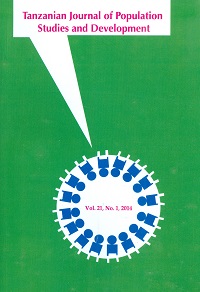Technical Efficiency and its Implications on Environmental Resources: The case of Small-Holders ' Maize Production in the Rufiji Basin, Tanzania
Abstract
Agricultural land expansion in Tanzania, like in many other developing countries, is spurred by poor intensification of agriculture, where the use of irrigation and fertilizer is low, or sometimes applied inappropriately. Poor agricultural intensification and development in turn means pressure to convert forests and other marginal land to crop production in the quest to meet food and cash requirements. Using technical efficiency (TE) production frontier, this study empirically analyses agricultural productivity in Rufiji Basin. Identification of TE in agricultural production can be helpful for policy making aimed at finding ways to increase efficiency, and at the same time conserving environmental resources. The findings are that, estimated mean TE of maize is around 41% implying that there was substantial technical inefficiency in maize farming in Rufiji Basin. This would suggest that there are exists 59% potential for increasing maize yield at the existing level of their resources, and therefore reducing the pressure on forest resources by rural households in Rufiji basin. The relevant factors for improving technical efficient include household farming experiences, sex, religion, and household involvement in other occupations.
References
Aigner, D.J., & S.F. Chu. 1968. On Estimating the Industry Production Function. The American Economic Review, Vol. 58, No.4: 826-839.
Aigner, D.J., C.A.K Lovell, & P. Schmidt. 1977. Formulation and Estimation of Stochastic Production Function Models. Journal of Econometrics, 21-38.
Amos T.T. 2007. An Analysis of Productivity and Technical Efficiency of Smallholder Cocoa Farmers in Nigeria.
Angelsen, A. & Kaimowitz, D. (eds). 2001. Agricultural Technologies and Tropical Deforestation. Wallingford, UK: CAB International.
Basnayake B.M.J.K., & L.H.P Gunaratne. 2002. Estimation of Technical Efficiency and Its Determinants in the Tea Small Holder Sector in the Mid Country Wet Zone of Sri Lanka. Sri Lankan Journal of Agricultural Economics. Vol 4, Part 1: 137-150.
Battese, G.E., & G.S. Corra. 1977. Estimation of a Production Frontier Model: With Application to the Pastoral Zone of Eastern Australia. Australian Journal of Agricultural Economics, Vol. 21, No. 3: 169-179.
Battese, G.E., & T.J. Coelli. 1995. A Model for Technical Inefficiency Effects in a Stochastic
Boshrabadi M.H, R.Villano & E. Fleming. 2007. Technical Efficiency and Environmental-Technological Gaps in Wheat Production in Karman Province of Iran.
Chirwa E.W. 2003. Sources of Technical Efficiency among Smallholder Maize Farmers in Southern Malawi. Mimeo. Department of Economics, Chancellar College, Zomba, Malawi.
Coelli, T. 1994. A Guide to Frontier Version 4.1: A Computer Program for Stochastic Frontier Production and Cost Function Estimation. University of New England, Australia.
€”. 1995. Recent Developments in Frontier Modeling and Efficiency Measurement. Australian Journal of Agricultural Economics, Vol. 39 (03).
€”. 1996. A Guide to Frontier Version 4.1: A Computer Programme for Stochastic Frontier Production and Cost Function Estimates. University of New England, Armidale, NSW, Australia.
Coelli, T.J. & G.E Battese. 1996. Identification of Factors which Influence the Technical Inefficiency of Indian Farmers. Australian Journal of Agricultural Economics 40: 103 -128
Geist, H.J. & Lambin, E.F. 2001. What Drives Tropical Deforestation? A Meta-analysis of Proximate and Underlying Causes of Deforestation Based on Subnational Case Study Evidence.
Idiong, I.C. 2007. Estimation of Farm Level Technical Efficiency in Small-scale Swamp Rice Production in Cross River State of Nigeria: A Stochastic Production Frontier Approach.
Illukpitiya, P. 2005. Technical Efficiency in Agriculture and Dependency on Forest Resources: An Economic Analysis of Rural Households and the Conservation of Natural Forests in Sri Lanka.
Jumbe C.B.L., & A. Angelsen. 2006. Forest Dependence and Participation in Forest Co-Management in Malawi. A paper prepared for presentation at the 11th biennial conference of the International Association for the Study of Common Property (IASCP), Bali, Indonesia: 19- 23 June.
Kebede, T.A. 2001. Farm Household Technical Efficiency: A stochastic Frontier Analysis. A study of Rice Producer in Mardi Watershed in the Western Development Region of Nepal.
Khanna, G. 2006. Technical Efficiency in Production and Resource Use in Sugarcane: A Stochastic Production Function Analysis. HEI working Paper No. 15/2006.
Kibaara, B.W. 2005. Technical Efficieny in Kenyan ' s Maize Production: An Application Of The Stochastic Frontier Approach. MA thesis. Colorado State University.
Lokina, R.B. 2005. Efficiency Risk and Regulation Compliance: Applications to Lake Victoria Fisheries in Tanzania. PhD Thesis, Department of Economics, Göteborg University, Sweden.
Lokina R.B., K. Kulindwa, & A.S. Hepelwa. 2006. An Estimation of the Willingness to Pay for Improved Water Services in Tanzania. Utafiti , Vol.7, No 1.
Madulu, N. 2004. Assessment of Linkages Between Population Dynamics and Environmental Change in Tanzania.
Meeusen, W., & J. van den Broeck. 1977. Efficiency Estimation from Cobb-Douglas Production Functions with Composed Error. International Economic Review 18: 435-444.
Msuya, E. & G. Ashimoyo. 2007. Estimation of the Technical Efficiency in Tanzanian Sugarcane Production: A Case Study of Mtibwa Sugar Estate Out-growers Scheme. MPRA Paper No. 3747.
Stevenson, R.E. 1980. Likelihood Functions for Generalized Stochastic Frontier Estimation. Journal of Econometrics, Vol.13: 57 €“66.
Tchale, H., & J. Sauer. 2007. The Efficiency of Maize Farming in Malawi. A Boot Strapped Translog Frontier.
Vaidyanathan, A., & K. Sivasubramaniyan. 2004. Efficiency of Water Use in Agriculture. Economic and Political Weekly, July 3, 2989-2996.
Wooldridge, J.M. 2000. Introductory Economics: A Modern Approach. South Western College Publishing.


